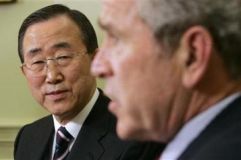Bush, UN’s Ban to cooperate Darfur, Iran
Jan 16, 2007 (WASHINGTON) — US President George W. Bush and UN chief Ban Ki-moon worked to push past any lingering US-UN ill will and vowed to work together on issues like Middle East peace and violence in Darfur.
 “You want to talk, pick up the phone and call me,” Bush twice encouraged Ban as they wrapped up an hour-long meeting that also covered Iran, Iraq and climate change, according to UN sources.
“You want to talk, pick up the phone and call me,” Bush twice encouraged Ban as they wrapped up an hour-long meeting that also covered Iran, Iraq and climate change, according to UN sources.
Ban, who took over January 1 as secretary general, told reporters after the meeting that he would push “vigorously” for UN reforms and urged the world community to give war-torn Iraq “all possible assistance.”
“The Middle East is a source of grave concern. This deteriorating situation in Iraq and Israel needs (the) urgent attention of the international community,” Ban said outside the White House.
“Particularly when it comes to Iraq, the international community should have all possible assistance to help the Iraqi government and people to restore peace and stability and recover from economic devastation,” said Ban.
During their joint public appearance in the Oval Office, Ban and Bush struck a cordial tone, noting their past cooperation on the North Korean nuclear crisis when the UN chief was South Korea’s foreign minister, and vowed to work closely on other issues like Iran’s atomic ambitions and violence in Darfur.
“The United States wants to work with the United Nations to achieve peace through the spread of freedom,” said Bush. “I admired the way you handled your previous job, and I’m confident you’ll do a fine job now.”
“I want to thank you for your commitment to help the suffering people of Darfur. I wish you all the best as you work hard to convince the president of the Sudan that it’s in his interests and in the world’s interest that he allow enhanced African Union peacekeepers in,” said Bush.
Bush did not mention Washington’s repeated called for UN reforms — in US Security Council membership, peacekeeping operations and transparency following the ethics scandals surrounding the oil-for-food deal with Iraq.
But Ban told reporters after the meeting that he was pushing “vigorously” for such changes, while a UN source said Ban was leading the way towards greater financial disclosures by top UN officials.
“The United Nations should change with much more efficiency and effectiveness and mobility and the highest level of ethical standard,” said the secretary general.
Behind closed doors, Bush and Ban worked to banish any lingering tensions between the United Nations, which did not explicitly authorize the war in Iraq, and the United States, the world body’s biggest donor and frequent critic.
But the meeting yielded no breakthroughs on Iraq, the Middle East peace process and efforts to limit climate change — an issue the secretary general brought up as their face-to-face talks wrapped up, the sources said.
Ban called climate change “a global problem that needs to be addressed globally,” while Bush retorted that “folks who sign on to protocols like Kyoto need to live by them,” referring to the UN pact aiming to cut emissions of so-called “greenhouse gases,” according to one UN source.
The US president was expected to lay out his climate change approach in his annual State of the Union speech on January 23.
On Iraq, Bush told Ban the United States “would appreciate any further role, political, not military” for the United Nations, while Ban said the world body was “constrained by the ongoing security problems,” the UN source said.
On North Korea, Ban and Bush agreed on the need to pursue six-nation talks grouping China, Japan, North and South Korea, Russia, and the United States, the source said.
But UN sources said Ban was also “contemplating” the possibility of naming a special envoy, while stressing that “it’s not going to happen immediately.”
(AFP)
